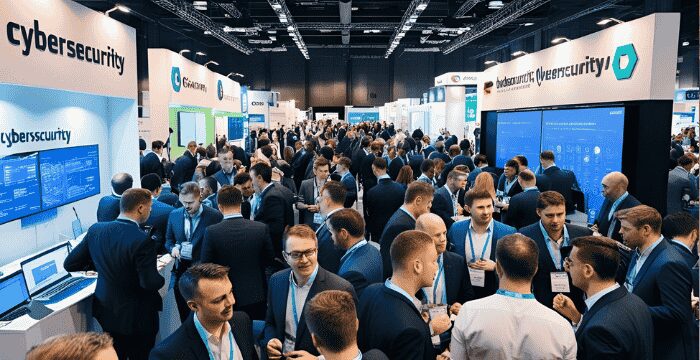Cyber security jobs in Germany are experiencing unprecedented growth in 2025, creating abundant opportunities for professionals in this dynamic field. As industries are digitalising more rapidly, German companies are focusing more on security and requesting more cybersecurity experts. Regardless of your work experience, Germany provides many career opportunities and good pay.
Top Cyber Security Jobs in Germany in 2025
Cyber security jobs in Germany are thriving in 2025, with thousands of positions available across various sectors. At present, there are more than 341 openings in cybersecurity in Berlin, and this number continues to rise every day. German cybersecurity is currently valued at €6.86 billion and is expected to increase by 8.20% each year to reach €9.85 billion by 2029.
Big organizations such as SAP, Deutsche Telekom, Bosch and Allianz are looking for cyber security experts to keep their digital data safe8. Security engineers and risk management specialists are targeted by SAP, while Deutsche Telekom needs security architects and incident responders.
Strong demand comes from various causes such as:
- Every 39 seconds, there is a new cyber attack happening.
- Tough data protection laws in the EU, along with the NIS2 regulations that will take effect in March 2025.
- Germany is one of the continent’s main centres for technology.
- It is estimated that cybercrime will cost $10.5 trillion by 2025
Because many German companies experience breaches related to cybersecurity, the shortage of qualified professionals has led to fierce competition among businesses to win and hold on to them.
Top Jobs Sought After in Germany’s Cyber Security Industry (2025)
Posts for Security Analyst
Their role is to prevent and manage cybersecurity issues in Germany. They constantly check and secure business networks to make sure there are no breaches in German companies. Security professionals are tasked with reviewing risks, examining security logs, developing security policies and responding to any security issues.
To do this job, you need to be skilled with firewalls, SIEM solutions and be able to work with network protocols. According to market reports, an annual salary of approximately €60,000 (₹53,07,000) is typical for Security Analysts in Germany.
What Does a Penetration Tester Do?
Companies and organisations across Germany are hiring more ethical hackers because they want to be prepared for possible vulnerabilities. It is the job of Penetration Testers to spot potential threats to security before anyone else can take advantage of them. They run authorised simulations to test the organisation’s IT systems and find any potentially vulnerable areas.
Having the Offensive Security Certified Professional (OSCP) or GIAC Penetration Tester (GPEN) certification is highly valued by penetration testers in Germany. The usual salary earned by a Penetration Tester in Germany is about €65,000 (₹57,49,250).
SOC Analyst
Monitoring and analysing the security of an organisation is the primary role of a SOC Analyst. In security operations centres, they utilise different tools and technologies to identify, study and address security issues. Most SOC Analysts in Germany earn about €55,000 (₹48,64,750).
Information Security Manager.
People look for information security management jobs in Germany because they are very desirable positions. Their job includes outlining and putting into action an organisation’s security policy for information. They handle security teams, oversee their budgets and ensure that regulations are complied with. The average salary for an Information Security Manager in Germany is given as €80,000 (₹70,76,000) each year.
Chief Security Information Officer (CISO)
Being a CISO in Germany is the top job in the cybersecurity field. CISOs lead the development and application of an organisation’s security strategy at the executive level. They collaborate with other C-suite leaders to ensure security efforts support the company’s goals. Most CISOs in Germany earn more than €120,000 (₹1,06,14,000).
Latest Skills and Qualifications Required for Cyber Security Jobs in Germany in 2025
Technical Skills
The technical skills required for cybersecurity jobs in Germany include:
- The languages used in this book are Python, Java and C++.
- Tools for security include firewalls, SIEM solutions and encryption.
- Understanding protocols and the structure of the network is important for network security.
- Cloud security: As more firms move data to the cloud
- The team is able to identify and address threats.
Many experts say that cloud security, knowledge of AI security and response to incidents are growing in importance as the cybersecurity industry progresses.
Certificates and Degrees
German employers value the following certifications for cyber security jobs in Germany:
Certified Information Systems Security Professional (CISSP).
- Certified Ethical Hacker is a title.
- GIAC Security Essentials is known as GSEC.
- CompTIA Security+
- Offensive Security Certified Professional (OSCP)
9 out of 10 German companies choose candidates with certificates, and plenty are ready to pay for their workers’ training11. Many companies prefer applicants with degrees in Computer Science, IT, Mathematics or Physics, and they may only hire those who hold a bachelor’s degree in these areas.
Soft Skills and the Ability to Speak Languages
Besides knowledge in technical fields, cybersecurity professionals in Germany need to have additional skills as well.
- The ability to think logically and solve different problems
- Explaining technical subjects to people who are not tech-savvy
- Being logical and focused on small details
- Ability to stay focused during security incidents.
While many cyber security jobs in Germany are available in English, knowledge of German can be beneficial, especially for roles involving interaction with local clients or regulatory bodies. Since many startups and tech firms in Berlin, Munich and Frankfurt use English, these cities are popular among international business people.
Top German Companies for Cybersecurity Professionals in 2025
International Tech Companies
Some of the leading technology companies operating in Germany’s cybersecurity sector are:
- Microsoft
- Accenture
- Palo Alto Networks
- IBM Germany
- Canonical
You can find opportunities with these companies, such as working as Security Analysts, Security Engineers or Security Consultants, and they are famous for their good salaries and extra benefits.
Industry Leaders Play A Key Role In The German Economy
Germany’s own corporate giants are also major employers in the cyber sector in Germany:
- SAP: Depending on the system or setup, security engineers and risk management specialists may be hired.
- Deutsche Telekom: Recruitment of security architects and incident responders is part of Deutsche Telekom’s efforts.
- Bosch: Bosch is interested in hiring penetration testers and security analysts.
- Allianz: Assigning information security managers and cyber risk analysts their responsibilities
- Siemens: Siemens provides several cybersecurity positions.
They have built a positive work culture, maintain a high level of professionalism and focus on advancing cybersecurity.
There Are Firms That Specialise Entirely In Cyber Security
Many German cybersecurity companies are making important contributions to the field.
- Qualysec: Qualysec provides VAPT, security consultation and incident response services.
- Infopulse: We offer comprehensive security solutions.
- Exadel: Exadel offers a range of security services suited to specific needs.
Because of their role in specific security fields, they often give professionals the opportunity to focus on particular areas of cybersecurity.
Latest Average Compensation for Security Professionals in Germany 2025
Entry-Level Positions
Entry-level cyber security jobs in Germany typically offer competitive salaries:
- A Security Operations Centre Analyst earns €55,000 (₹48,64,750) on average.
- Cyber Security Analyst: 60,000 Euros (53,07,000 Indian Rupees)
- As a Junior IT Security Consultant, you can expect to earn €55,000 to €65,000.
Because security is so important, these starting salaries for IT positions are much higher than many others.
People aspiring to become mid-level or senior employees can mention how they wish to actively contribute to the organisation.
As professionals gain experience in cyber security jobs in Germany, salaries increase significantly:
- Salary for an IT Security Specialist is around €70,000 (₹61,91,500).
- The salary for a Penetration Tester is €65,000 (₹57,49,250)
- The Network Security Engineer earns €75,000 (₹66,33,750).
- The Information Security Manager will receive a salary of €80,000 (₹70,76,000).
- A Cyber Security Consultant receives an annual salary of €85,000 (₹75,18,250).
The market reports that most Cyber Security Engineers employed in Germany earn up to €75,000 per year, although the average is closer to €65,000, with some salaries ranging from €52,500 to €75,000.
| Market Percentile | Salary |
| Top 10% of the market | €75,000 |
| Top 25% of the market | €67,500 |
| Average salary | €62,900 |
| Median salary | €65,000 |
| Bottom 25% of the market | €59,500 |
| Bottom 10% of the market | €52,500 |
The median salary of €65,000 indicates that you will earn this amount or more it or you will earn less if you are hired as a Cyber Security Engineer.
Executive Positions
Executive-level cyber security jobs in Germany command premium compensation:
- If you become a Chief Information Security Officer (CISO), you can earn over €120,000 (₹1,06,14,000).
Generally, these top-level jobs are encouraged by additional bonuses, sharing profits and other benefits.
How to Break into the Cybersecurity Field in Germany 2025?
Educational Pathways
To begin a career in cyber security jobs in Germany, consider these educational paths:
- Getting a degree in IT, Computer Science or Cyber Security
- Reps should be certified in CompTIA Security+, CEH or CISSP.
- Programs are made for special training in boot camps
- German companies provide dual study programs.
You can strengthen your expertise by taking cybersecurity courses, learning Python and getting certified in these fields: CEH, CISSP or GSEC.
Getting experience in actual settings
Being experienced in your field is important to German employers.
- Working on a tech or security company internship
- IT jobs at the entry level that cover security.
- Being part of capture-the-flag events and hackathons
- Open-source security projects and the contributions people make to them
- Developing an area to carry out your own experimentation
Having hands-on experience and winning online competitions can improve your chances of finding a job in Germany.
Networking and Ways to Search for a Job
Effective networking and job search strategies for finding cyber security jobs in Germany include:
- Participating in industry activities and gatherings in Germany
- Becoming a member of IT security-related organisations
- Looking for jobs by using job sites such as LinkedIn, GermanTechJobs and EnglishJobs.de
- Reaching out to recruiters who recruit in the cybersecurity field
- Posting articles on blogs or joining online forums about security
Get involved in the cybersecurity community by attending meetups to explore opportunities that may not be available to everyone.
What to Expect in the German Cyber security Job Market in 2025?
Areas of Work with More Options
Several sectors and specialisations in cyber security jobs in Germany are expected to see significant growth:
- Protecting cars that can communicate and drive on their own
- Ensuring connected devices and their networks are secure.
- Securing the infrastructure and applications used on the cloud
- Securing AI and machine learning by dealing with recent cyber risks and possible defences
- Protecting the important details of patients and the equipment used in healthcare
The automotive industry is doing well, as the cybersecurity market for it is increasing by 18.37% every year.
Influence of New Laws
Because rules in Germany continue to change, specialists who grasp the laws are very much needed.
- The GDPR (EU General Data Protection Regulation)
- IT Security Act 2.0 is the updated version of the IT-Sicherheitsgesetz.
- The revised Directive on Network and Information Systems (NIS2) will be effective from March 2025.
- Regulations that address the needs of specific industries for critical infrastructure
With the new NIS2 regulations coming into effect, understanding compliance and data protection will be increasingly important for professionals in cyber security jobs in Germany.
Education for Success in the Future
Experts in cybersecurity should concentrate on advancing their skills to keep up with advancements in the field.
- Knowledge of modern security for quantum computing
- Learning how AI is used in security software and detecting threats
- Being familiar with how to apply security in software development and DevSecOps
- Guiding security processes to meet the objectives of the company
The field is evolving rapidly, and staying current with new technologies and threats is essential for long-term career success in cyber security jobs in Germany.
Issues and Advantages for People Working Across Borders(2025)
Things to Consider with Visas and Work Permits
International professionals interested in cyber security jobs in Germany should understand:
- As of 2025, those who qualify for the EU Blue Card as highly skilled workers must have a job offer with an annual salary of at least €45,700.
- Visa options for those looking to find work in the country
- Validation of diplomas and degrees from other countries
- Needs for speaking or writing in a certain language
In Germany, IT professionals have the chance to apply for an EU Blue Card, a Work Permit for IT Professionals or even a Job Seeker Visa for a six-month job search period.
Fitting Into Japanese Culture and Society
To succeed in Germany’s work environment, you should:
- Being familiar with how German businesses and their people interact
- Joining together with people involved in cybersecurity locally
- Getting familiar with the ways German workplaces operate
- Meeting the needs of international business and the laws of the country
Taking time to understand these cultural aspects can significantly enhance your success in cyber security jobs in Germany.
Language Learning Resources
Even if a lot of cyber security jobs are written in English, being able to speak German can boost your career.
- You can use Duolingo or Babbel to improve your language abilities online.
- Integration courses organised by the German government
- There are language exchange groups in the main German tech hubs.
- The list of technical German words for IT specialists
Learning some German can help you improve your daily life and achieve your career goals in the country.
Conclusion
The cyber security jobs in the Germany market present exceptional opportunities for professionals at all career stages in 2025. Because of high demand, lucrative wages and numerous career paths available, Germany offers many excellent cybersecurity opportunities to those who live in Europe.
This growth in the German cybersecurity market and the lack of skilled professionals show that this trend will continue for the near future. With the right education, official certifications and work experience and an understanding of what Germany requires, experts can do well in this industry.
Because the German economy is strong and security is a priority, Germany is an ideal place to pursue and succeed in cybersecurity.
FAQs: Frequently Asked Questions
Q1. What are the positions in cybersecurity that will experience the highest demand in Germany in 2025?
Ans. The leading roles people want to apply for are Security Analysts, Penetration Testers (Ethical Hackers), Security Operations Centre (SOC) Analysts, Information Security Managers and Chief Information Security Officers (CISOs). A range of big tech companies, banks and security firms look for IT security specialists.
Q2. How much money can a cybersecurity professional in Germany make?
Ans. Most SOC Analyst or Cyber Security Analyst jobs begin with a yearly salary of around €55,000–€60,000. A Penetration Tester or Information Security Manager working at a mid-level or senior rank can be paid between €65,000 and €85,000 per year, while CISOs are usually paid more than €120,000 every year.
Q3. What skills and certificates should job seekers focus on when applying to German companies?
Ans. Having knowledge in Python, Java, C++, firewalls and SIEM, as well as network, cloud and incident response, is crucial. CISSP, CEH, OSCP, GSEC and CompTIA Security+ are some of the top IT security certifications. Nearly all German businesses prefer applicants with recognised certifications.
Q4. Is it necessary to know German to have a career in cybersecurity in Germany?
Ans. While many cybersecurity jobs in Germany are available in English, especially in international companies and tech hubs like Berlin, knowledge of German is advantageous for roles involving local clients or regulatory work. Speaking German can improve your chances of landing a job and fitting in at work.
Q5. What are the main challenges and opportunities for international professionals seeking cybersecurity jobs in Germany?
Ans. There is a high demand for skilled workers internationally, and those who move to Germany can apply for the EU Blue Card. However, professionals face bureaucracy with permits, getting accustomed to work culture and in some cases, the language barrier. Yet, since skilled IT workers are welcome in Germany and there is a shortage of cybersecurity specialists, it attracts many foreigners.










